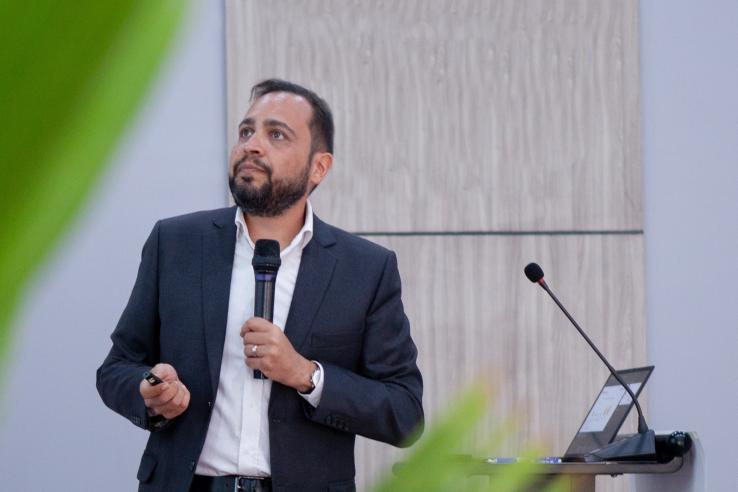Alumni Voices: What it takes to make policy change

As the first Executive Director of the J-PAL Southeast Asia office from 2012-2015, Héctor Salazar Salame established the institutional structure of the regional office. Building on J-PAL’s prior decade of work in Indonesia and Southeast Asia, he also grew the office’s portfolio of projects in partnership with research, government, donor, and NGO partners. He currently serves as the Country Representative of The Asia Foundation in Timor-Leste.
When most people learn that I used to work at J-PAL, they assume I am an economist with the ability to conjure up complex mathematical equations on demand. This could not be further from the truth. I am not a trained economist, and, frankly, I would struggle to interpret, let alone produce, a simple regression equation.
In turn, I appreciate every opportunity to dispel the notion that J-PAL is comprised solely of quantitative wunderkinds and economists (or economists-in-training) staring at spreadsheets. The reality is that J-PAL’s accomplishments are the product of an interwoven fabric of staff and partners, ranging from NGOs to policymakers, that contribute diverse skills to the effort of ensuring policies are informed by rigorous evidence.
I hope to shine a light on the processes and actors that typically remain unseen yet are essential to the production and dissemination of evidence and policy influence in the ever-changing field of social science.
Stakeholder collaboration and a crystal ball
The societal challenges J-PAL and other development institutions aim to address are wide-ranging, from the suboptimal distribution of social assistance programs to climate change. The prevalence of these challenges varies depending on each country and/or its provinces and is constantly in flux. A significant part of my work at J-PAL SEA was maintaining the pulse and nuanced contextual understanding of policy dynamics as well as political reform openings, particularly in Indonesia.
This required building a strong network of, and growing the linkages between, government, research institutions, NGO, and donor stakeholders to assess pressing issues and design interventions that would benefit from rigorous evidence. The effort that goes into maintaining these networks and the contributions they make to research designs are often not highly visible. Yet they are essential to ensuring the policy relevance of interventions and that there are vested champions to disseminate and act on the outputs. For these reasons, in my subsequent professional endeavors, I have continued to strive for consensus-based approaches to project design.
Further, recognizing that evidence generation and policy change takes time, my work at J-PAL enshrined the importance of consulting and working with stakeholders to decipher the crystal ball of forthcoming priorities to stay one step ahead of the policy environment. In other words, not just addressing today’s challenges but identifying and building evidence related to the pressing issues likely to arise tomorrow.
Enumerators: the unsung heroes
Most of the J-PAL projects I worked on, and many of the initiatives I oversee at The Asia Foundation, rely on surveying to capture vital information—from intervention effectiveness to public perceptions. A brilliant research design can be decimated by poor enumeration. Though they are rarely recognized publicly, enumerators are the lifeblood of successful surveys. It cannot be overstated that the validity of findings rests largely in their hands.
A significant amount of training and quality assurance takes place behind the scenes of any survey. Ultimately, however, it is the enumerators that, rain or shine, tirelessly travel throughout provinces and countries, including to the most remote of locations. From my time at J-PAL until now, my appreciation for enumerators and their work grows each day.
Operations: keeping the engine humming
As part of establishing the J-PAL SEA office, I was tasked with shaping most in-country operational systems, policies, and procedures. Through this experience I learned firsthand the complexity of establishing fit for purpose operations systems. From negotiating contract and grant agreements and financial reporting to ensuring the electricity bill is paid, operations teams are what keep an organization’s engine humming. While rarely in the limelight, they are a keystone of any successful organization; there is little that would be accomplished in their absence.
Social Science: “All else cannot be held equal.”
During my time at J-PAL, and to this day, there are times I find myself envious of the “hard” sciences. Actions and reactions in chemistry or physics experiments, for example, can be replicated ad nauseam within controlled conditions. Social science, on the other hand, cannot control environments indefinitely. Built environments, political economy, politics, and societal structures are ever changing. In turn, what works today may not work tomorrow because “all else cannot be held equal” over time.
This reality is a challenge and a motivator to continue updating assumptions, concepts, and interventions to keep up with a dynamic world. As reflected in the points above, this cannot be done in isolation. It requires relationships, partnerships, and strong multidisciplinary teams and organizations. It also necessitates an ongoing inquisitiveness to keep innovating approaches to address the most pressing challenges.
